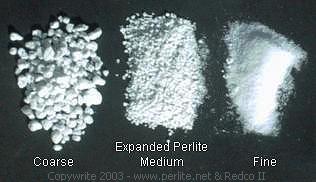It occurs naturally and has the unusual property of greatly expanding when heated sufficiently. It is an industrial mineral and a commercial product useful for its low density after processing. This expansion period can be reached by the help of water in rough mineral. Depending upon design conditions, reductions in heat transmission of percent or more can be obtained when perlite loose fill is used in the hollow cores of concrete block or cavity type masonry walls. Is perlite and perlite the same thing?

What is the best perlite for expanding? The expansion process is caused by the presence of water in the crude rock. When perlite ore is rapidly heated to above 850°c this water vaporises and causes the softened rock to expand.
Tiny glass-like bubbles are produced which account for the lightweight and exceptional physical properties of expanded perlite. The expanded perlite is a white granular material that is extremely lightweight, the new structure gives it remarkable thermo-acoustic qualities. The countless micropores of dry air in the new structure makes the material behave as a very efficient natural insulator. As it does, the water that’s trapped in the volcanic glass vaporizes and tries to escape. Horticultural, construction, industrial.
Always on stock any quantity. Buy Top Products On eBay. Money Back Guarantee! Find Great Deals Now! Join the NºB2B online marketplace for chemicals in Europe and start ordering now!
The perlite expands times its original volume. The excellent thermal conductivity of expanded perlite. It is used mainly in the construction sector as a levelling material to form substrate for screeds, as thermal and acoustic insulation, in the production of perlite concrete, for the insulation of wooden ceilings, for wall insulation, etc. The size and grade of expanded perlite determine its use. Four main families of perlite are manufactured by IMERYS: perlite ore, expanded unmilled perlite , expanded milled perlite refined for filter-aids use, expanded milled perlite refined for functional additive applications.
Perfect amendment for propagation and seed cultivation, plug production and transplants, interiorscape and planter growing, composting, hydroponic cultures, turf and lawns and around shrubs, trees, and landscaping. Perlite is a naturally occuring glassy volcanic rock. Rapidly heating perlite ore to temperatures of about 900°C (700°F) softens the volcanic glass causing entrapped water molecules in the rock to turn to steam and expand the particles like popcorn. Crushed expanded perlite particles present a maze of microscopic pathways that can be used to fillter and clean a wide array of liquids, beverages, and pharmaceutical products.
Nicknamed “volcanic popcorn,” perlite is made by heating volcanic glass to super high temperatures until it expands and “pops” into the white, porous, lightweight rock that resembles little Styrofoam balls. Perlite’s unique property is expansion in its specific volume in times when heated up to softening point. Expanded perlite is extensively used globally in various branches of industry. The low density and high porosity are two properties of expanded perlite. The application purposes other beneficial properties of temperature stability.

Expanded Unmilled Products: the perlite ore is injected into a naked flame in the base of the expansion tower. Expanded Milled Products for Filter-Aids: the expanded perlite produced from the furnace is milled and classified. With our experienced and educated personnel and modern facilities, quality philosophy in production is adopted as customer satisfaction, non‐compromising from quality and giving importance to human health and nature. It is inorganic, non-combustible and meets or exceeds the physical property requirements of ASTM C610.
It is distinguished from other volcanic glasses, when heated to a suitable point in its softening range, it expands from four to twenty times its original volume. Unfortunately during both production as well as processing of expanded perlite , some fine grained waste perlite is being formed. These tiny cells that absorb moisture on the exterior of the particle, and prevent it from entering inside. That is why it is particularly useful in providing moisture to plant roots.
This expanded perlite is much lighter in weight and becomes porous. Expanded clay pellets like these can be used instead of perlite or vermiculite. It usually appears as clay pebbles that look brownish or gray. For more information, check out this article on expanded clay from.
EXPANDED PERLITE POWDER. Since perlite is a mineral it will not decompose and advantageously it carries a neutral pH balance. This means it will match the pH balance of your soil when combine instead of change it.
It forms an expanded platelike structure that traps air, moisture and nutrients present in a potting soil mix. It comes in a variety of sizes, but the larger particles are commonly used in the garden because they add more aeration to the soil.
No comments:
Post a Comment
Note: only a member of this blog may post a comment.